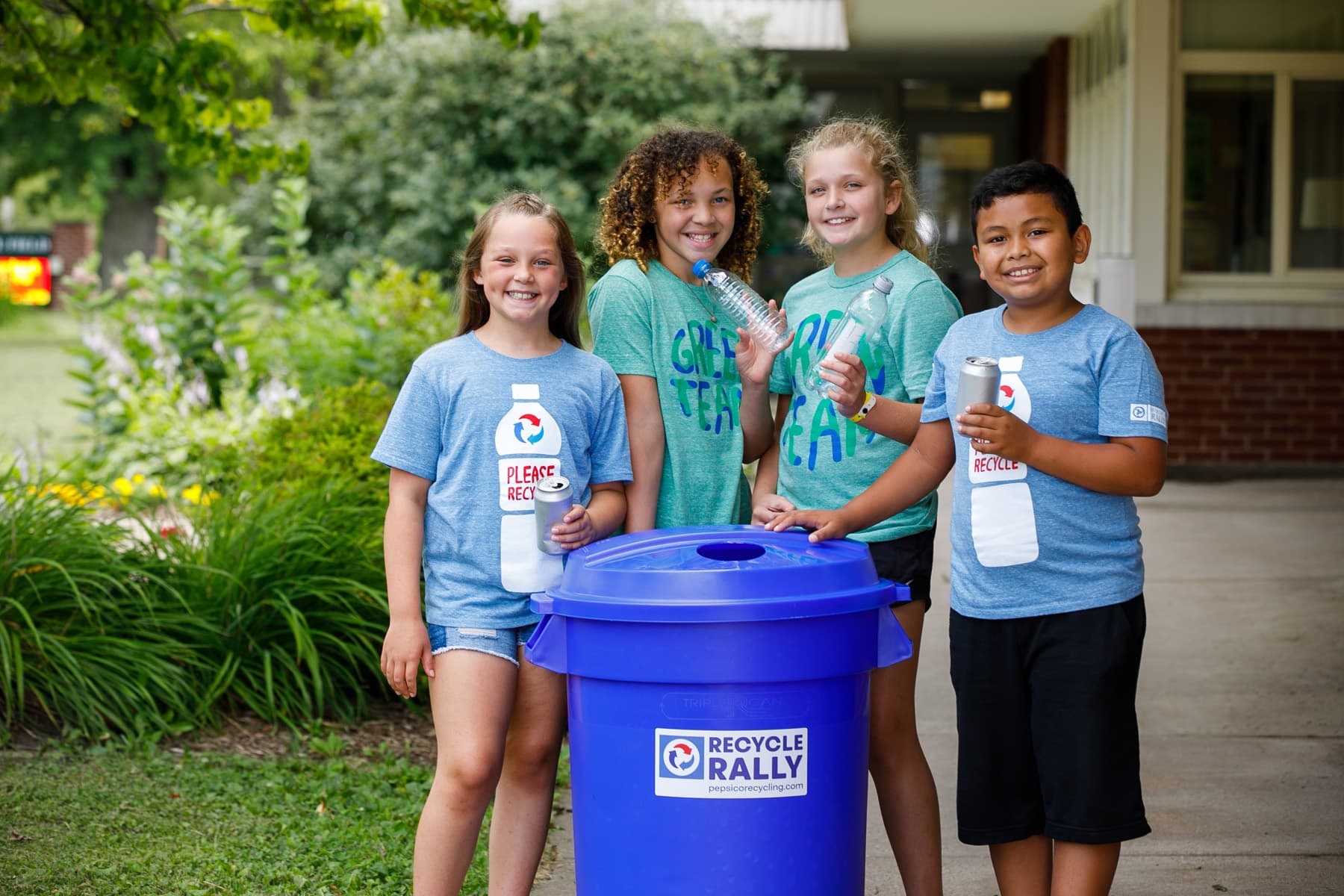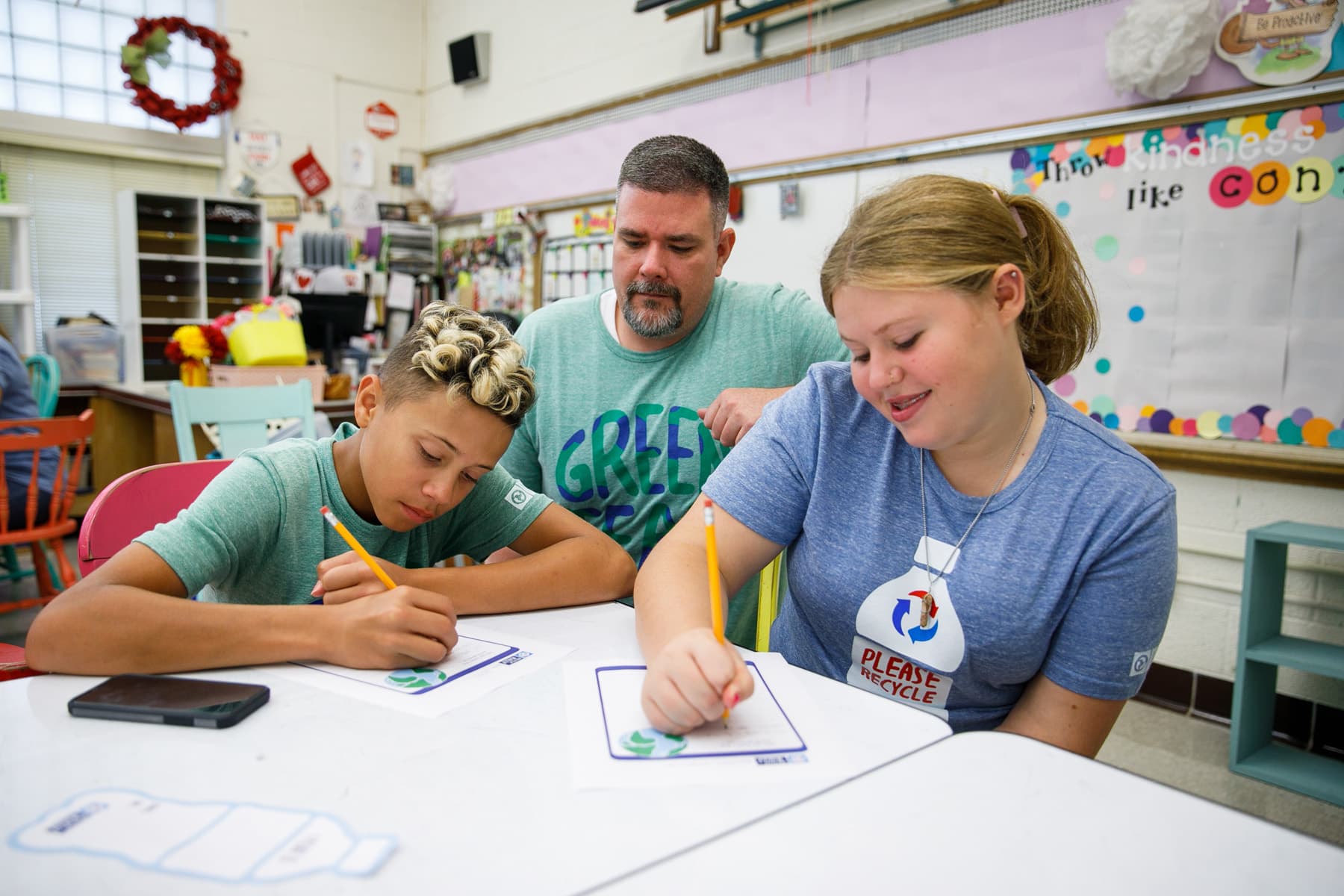Video: Participants Share Ideas for Starting Recycle Rally at Your School
The first step is the hardest.

Getting ready to kick off a recycling program at your school? Check out these ideas from real participants for starting Recycle Rally with your students.
What steps did you take to implement Recycle Rally at your school?
Isabelle Anaya: When we first started the PepsiCo Recycle Rally, we didn’t have any recycling bins. So students would collect the paper boxes that teachers would get in the teachers’ lounge. They would put “Recycle Rally” all around it, and they would attach items that we were allowed to collect. They would place those in each of the hallways. At the time, we weren’t sure how much recycling we were going to collect on the campus, so it started off with just one box per hallway. We have recycling bins all over the campus now! In every single hallway, we have the Recycle Rally container with a sign that shows them what to recycle and what not to recycle.
Patty Meehan: I got up in front of the school one morning, and I had put together a PowerPoint that we put up on the screen. I introduced the program and told them that we would be collecting recyclable materials. The first year we did it, we just collected. We didn’t have any competitions or anything like that, but that’s how I introduced it.
What was the most important step you took in starting Recycle Rally?
Ginger Reasonover: One of the most important was to make sure that your administrator and facilities folks were on board.
Paul Perea: What was so funny was that we kind of worked it backwards. It was staff first, then students, then parents. The reason why we worked it that way was because, of course, staff needs to know what’s going on. Then students are the second source so they can teach their parents.
Anese Forsyth: You have to have labels that show “In this area we recycle #1 and #2 plastic.” For paper, it needs to say “Clean and Dry Paper.” The labels are a critical and vital part of a recycling program.
How did you promote the program at your school to encourage recycling?
Isabella Anaya: One of the things that we did to really promote recycling was create videos. They would post them on the morning announcements for the campus to see. One of our third grade teachers is a musician, so he created a song, and he would play his guitar in the morning. He also did a music video with our students to promote recycling on our campus. P.E. coaches did recycle games.
Patty Meehan: I sent out email to all the teachers reminding them where all the bins are close to their classrooms. We put up posters from Recycle Rally all over the school about what to bring, what not to bring.
Have you established a dedicated group of staff?
Paul Perea: Our custodial staff are the ones that deserve a big thumbs up for why it worked out so well. They helped us out with teaching kids. There would be times when they were about to throw away something that was plastic, and our custodial staff would be the ones to say, “Whoa, wait, we have those blue bins right over there for plastic.”
Susan Paszkowski: The custodians, you really need them on board, so they know where all these things are going and what you want them to do with it. For instance, in the lunchroom, they would just start putting the bottles and cans in the dumpster. I’m like, “Oh, wait! We need to count those, and weigh those, and sort them.” So they’re a key to it.
In hindsight, what might you have done differently?
Isabelle Ayana: I would definitely have formed a bigger committee within our campus from the beginning. Form that committee with a group of teachers who have a passion for wanting to create change on your campus. Have parents represented as well, so you have that support at home. And then a community member, someone who can also help out.
How has the program evolved over the years?
Ginger Reasonover: One of the things that has evolved the most is that we have more people on board now. We have affected lives in our hometown, in our state, in the Southeast, across the United States. We have done all that on the backbone of recycling.
Anese Forsyth: I need some way to reward the kids and educate the kids, and PepsiCo Recycle Rally provides that. I use that site a lot to help me decide how I’m going to build the program.
How has Recycle Rally impacted your school the most?
Paul Perea: It brought family. It brought pride, joy, making a difference to our environment. That’s what I enjoy about bringing PepsiCo Recycle Rally to our school.
Advice for educators starting Recycle Rally at their school?
Ginger Reasonover: It was important for us to set deadlines with the kids, which was America Recycles Day. That gave the students time to gather supplies at home. It’s amazing how much students will bring in, even little students, when they get competitive. Parents also can be very competitive when they’re given a deadline.
Patty Meehan: Ask for help! I’m the only one running the program at my school, but I certainly ask for ideas and go to the students and ask for ideas. I involved everybody as much as I could and asked for the input. And that makes it a team.
Susan Paszkowski: Once they get going, it runs really smoothly. It’s like a checkout. They all have a job. Some of them weigh it, some of them write it down, some of them stuff it in the outside bin.
Anese Forsyth: The biggest piece of advice would be to use PepsiCo Recycle Rally resources. Then, don’t give up. Because, sometimes things don’t work out and you have to take a step up and do it again. It’s better to be recycling at all than not!
Looking for more inspiration as you are starting Recycle Rally? Check out the K-12 Recycling Resources folder here!
Starting Recycle Rally at Your School
Learn More

Recycle Rally
Recycle Rally is a free K-12 program that provides rewards and tools to help enhance recycling at your school!
Explore now
Additional Resources
Our comprehensive library of resources was designed to inspire the next generation of green leaders.
Explore now


